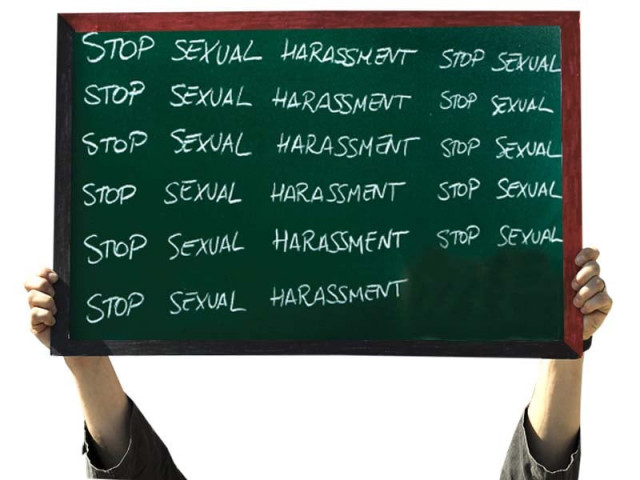Harassment in educational institutions: What should victims know and do?
Experts stress making laws, committees more accessible and responsive

Legal experts and student representatives in an online panel discussion stressed the need for making laws and committees on sexual harassment more accessible and responsive to victims in varsities, mostly students, and underscored the importance of understanding, and creating awareness about legal platforms already available to take perpetrators to task and support survivors of assault.
The discussion titled ‘Harassment in Educational Institutes in Pakistan’ held the other day also shed light on the recent cases of harassment that surfaced from different universities across Pakistan, the proceedings involved and what became of those cases.
Advocate and legal consultant Khadija Ali, beginning the conversation, said civil law and criminal law exist in Pakistan for sexual harassment with the latter being Section 509 in the Pakistan Penal Code which is applicable in public places and wherever harassment takes place.
Explaining the two laws she said, civil law is Protection Against Harassment of Women at the Workplace Act, of 2010 which is applicable in organisations. “Under this law, every organisation has to have an inquiry committee to register sexual harassment complaints by students or employees,” she explained. “Organisations have to designate competent authority to mull penalties against the accused ... moreover, we have ombudspersons in all four provinces where victims can file their complaints.”
Ali said students can now also file complaints under the act and the employee-employer relation is not a mandatory requirement, however, it’s important to understand that it is a civil law.
Continuing the discussion, Maliha Husain, the executive director of Mehergarh: A Centre For Learning, said victims should study laws available, educate themselves and never give up.
She narrated one such case of a victim who despite struggles did win the case. “It’s been 10 years since the law has been formulated but for many people it is fairly new and [benefitting from it] remains challenging,” Husain pointed out, urging victims of harassment to report the issue on multiple forums and keep fighting.
“You can set a precedent for an entire university [by reporting and taking a stand] against harassment.”
To a question about harassment committees, their efficiencies and the training required, Husain said fair and correct appointment is key.
“The law demands senior management’s representatives [for harassment committees] ... principled, trustworthy and gender-sensitive members can become good trainers. However, many members without training too are doing exemplary work,” she continued, citing “intention” as another prerequisite.
Wardah Noor, a student council’s batch representative from Lahore University of Management Sciences, shared the kind of harassment complaints they receive and the varsity’s mechanism to deal with them.
“The issue here is not the lack of harassment committees in institutions but societal structures that make reporting of such incidents difficult,” Noor said. “We do take credit for introducing laws 10 years ago but that alone doesn’t guarantee support to survivors. Bringing evidence, following the entire procedure is strenuous … you have to provide therapy to survivors too.”
Noor added that it was difficult for students to report cases and go through a long process while still being “mentally sound”.
“There is a need to educate people so that they know what counts as sexual harassment,” she affirmed while pointing out practices of victim-blaming still being pervasive in society.
Trying to assess the root cause of the problem, student activist and organiser at Progressive Students Federation Pakistan, Zahabia Khozema, said sexual harassment policies do not exist in many universities the way they should.
She also lamented lack of student representation in harassment committees. “There is no student voice because of the ban on unions ... the procedure itself is strenuous. These loopholes in administrative and policy level are big hindrances because of which many cases are not reported,” Khozema said, advocating for having student unions restored in varsities.
She added that if students will have a greater say in university affairs, they will be able to voice their issues and concerns more effectively. “Students also face blackmailing and harassment in coming forward,” she said.
The discussion was moderated by journalist Laiba Zainab and further discussed the roles of parents, society and the multiple issues victims face in coming forward.


















COMMENTS
Comments are moderated and generally will be posted if they are on-topic and not abusive.
For more information, please see our Comments FAQ